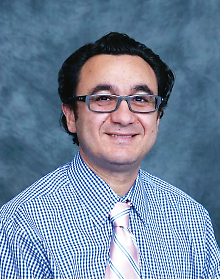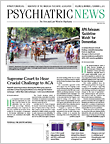A blood-pressure cuff may not seem like much, technologically, but for Malaz Boustani, M.D., it represents a crowning achievement in purpose.
“In less than five minutes, a doctor can use this tool to screen, diagnose, and guide treatment for hypertension,” he said. The cuffs are even simple enough that a nonprofessional can use them to assess their blood pressure at work or at home.
That led Boustani, the Richard M. Fairbanks Professor in Aging Research at the Indiana University School of Medicine, to wonder whether a similar clinical “super-tool” could be designed to rapidly assess the degree of dementia in older individuals.
Working with colleagues at Indiana, the Regenstrief Institute, and the Indianapolis Discovery Network for Dementia, he devised the Healthy Aging Brain Center (HABC) Monitor. While also straightforward—the monitor consists of 31 rated questions related to cognitive, functional, and psychological well-being as well as caregiver burden—and rapid—an average person could complete it in five to 11 minutes in the waiting room or over the phone—Boustani believes it could provide a boost to dementia screening in a primary care setting.
Alzheimer’s and other dementias pose a great burden on elderly individuals and their caregivers, yet many seniors are not getting routine cognitive screenings; a recent study found that almost half of people over age 70 with clear dementia had never received a cognitive evaluation (Psychiatric News, December 5, 2014).
Many factors play into this lack of screening, but it can be attributed in part to the limited time that primary care physicians can spend with an individual patient, who at older ages frequently presents with several medical comorbidities.
With just a few minutes available to assess cognitive health, current screening tools like the Clinical Dementia Rating are too extensive to be practical. “On the other hand, a physician should not just ask a few questions and then go with their gut,” Boustani told Psychiatric News. “Mental health can be subjective, but I believe measurement-based care is the right thing to do.”
While a cognitive test cannot provide truly objective readings like systolic and diastolic blood pressure, the HABC Monitor does combine efficiency with reliability, as Boustani and colleagues showed in a study published in 2012 in Clinical Interventions in Aging.
A trial involving 171 primary care patients and their caregivers found that caregiver-completed HABC Monitor scores produced nearly identical results as when the caregivers completed the Neuropsychiatric Inventory, a lengthier test that assesses behavioral symptoms in patients with dementia.
The monitor also displayed other features necessary for clinical utility—it showed consistent readings but was sensitive enough to reveal small changes in cognition between patient visits three months apart.
More recently, the team followed up to test HABC Monitor accuracy when patients filled it out. “We didn’t analyze this initially because we thought that self-reporting would not be reliable when screening for cognitive impairment,” Boustani said. After hearing anecdotal evidence from clinics that patient and caregiver reports often matched up, he decided to try.
“And this is why we do research, because the common assumption turned out be both correct and incorrect,” he said, referring to the results of the HABC self-report validation, which was published in Clinical Interventions in Aging this past December. The analysis of 291 patients found that self-reporting of severe dementia was not always reliable, but in cases of mild or no dementia, patient reporting was as valid as the caregiver version.
“There is a clear need to have relatively brief screening instruments to detect dementia in primary care settings, and these authors have shown good reliability and possible validity for their HABC Monitor,” said former APA President Dilip Jeste, M.D., Distinguished Professor of Psychiatry and Neurosciences and director of the Sam and Rose Stein Institute for Research on Aging at the University of California, San Diego.
“Obviously, further work is needed to assess its utility in diverse settings. As with all brief instruments, measurement of sensitivity and specificity will be crucial. It should also be stressed that there is a need for more detailed assessments to establish a diagnosis of dementia and certainly for determining its possible etiology.”
Boustani and his group are developing a second-generation monitor that can be applicable to a broader range of mental health issues than just dementia—conditions such as anxiety, depression, and chronic pain.
In the meantime, he encourages interested clinicians to try the HABC Monitor, which is available for free download; for tech-savvy seniors, a phone app is also being developed.
The development and validation of the HABC Monitor was supported by grants from the National Institute of Mental Health, National Institute on Aging, and Agency for Healthcare Research and Quality. ■
The HABC Monitor and scoring rules can be accessed
here. The 2012 article, “Practical Clinical Tool to Monitor Dementia Symptoms: The HABC Monitor,” is available
here. The 2014 article, “The Healthy Aging Brain Care (HABC) Monitor: Validation of the Patient Self-Report Version of the Clinical Tool Designed to Measure and Monitor Cognitive, Functional, and Psychological Health,” is posted
here.

